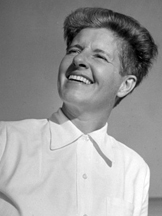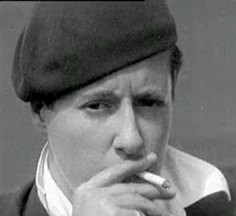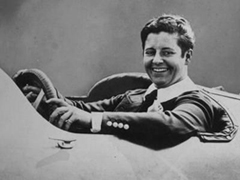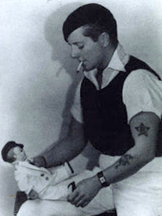 Many a 1930s screwball comedy mined the eccentricities of the well-to-do, but it’s hard to imagine even the most imaginative screenwriter coming up with a character as eccentric as Marion Barbara “Joe” Carstairs.
Many a 1930s screwball comedy mined the eccentricities of the well-to-do, but it’s hard to imagine even the most imaginative screenwriter coming up with a character as eccentric as Marion Barbara “Joe” Carstairs.
Carstairs, a ballyhooed champion speedboat racer in the speed-crazed 1920’s, wasn’t memorable merely for being the fastest woman on water. Her visible tattoos, penchant for cigars, and preference for men’s clothing ensured she stood out in a crowd.
Born in London in 1900, Carstairs inherited her wealth from her maternal grandfather,
Living in Paris in her teens, Carstairs had her first lesbian experience, about which she later remarked, “My God, what a marvelous thing. I found it a great pity I’d waited so long.” Soon thereafter, she took part in an affair with Dolly Wilde, Oscar’s niece.
 Carstairs served as an ambulance driver in France during World War I before traveling to Dublin to join the Women’s Legion Mechanical Transport Section. She returned to France following the signing of the Armistice to help to rebury the war dead as a member of the Royal Army Service Corps.
Carstairs served as an ambulance driver in France during World War I before traveling to Dublin to join the Women’s Legion Mechanical Transport Section. She returned to France following the signing of the Armistice to help to rebury the war dead as a member of the Royal Army Service Corps.
Carstairs returned to London to launch an all-female chauffeur service called the X-Garage in 1920 before selling that concern and turning her focus to speedboat racing.
Carstairs won a handful of championships in the 1920s, including the prestigious Duke of York’s Trophy, the Royal Motor Yacht Club international race, and the Lucina Cup. “I liked the boats,” Carstairs said. “I liked the way they behaved. I understood them.”
Carstairs earned the respect of her male counterparts in the world of speed-racing, and she proved to be a supportive and generous friend to many. Sir Malcolm Campbell, who held the world speed record on land and on water at various times in the 1920s and ‘30s, is said to have described Carstairs as “the greatest sportsman I know.”
 Though she lived openly as a lesbian, Carstairs married her old friend Count Jacques de Pret in 1918 in order to gain access to her trust fund and appease her drug-addicted, adulterous mother, Frances Evelyn Bostwick, who disapproved of her daughter’s sexual proclivities. Upon Evelyn’s death, though, the marriage was annulled on grounds of non-consummation.
Though she lived openly as a lesbian, Carstairs married her old friend Count Jacques de Pret in 1918 in order to gain access to her trust fund and appease her drug-addicted, adulterous mother, Frances Evelyn Bostwick, who disapproved of her daughter’s sexual proclivities. Upon Evelyn’s death, though, the marriage was annulled on grounds of non-consummation.
Carstairs bedded dozens of women in her life—among them, reportedly, actresses Tallulah Bankhead and Marlene Dietrich—but avoided long-term romantic attachments. It was said she kept a photographic file of 120 of the women she’d slept with, but her life’s companion was Lord Tod Wadley, a stuffed leather doll 12 inches in height that was a gift from a girlfriend in 1925.
What fostered Carstairs’ attachment to Lord Wadley is unclear, but she was rarely without him and even had tailored clothing made for him on Saville Row.
In 1934, Carstairs purchased Whale Cay (pronounced “key”)—a small island 30 miles northwest of Nassau and 90 miles east of Miami—for the sum of $40,000. She moved there and set up what might be described as a relatively benign fiefdom.
 Quickly making the island her own, Carstairs hired locals from her own and neighboring islands to clear away vegetation and build an extravagant plantation that boasted a huge house for herself and her guests as well as small cabins for her workers, a dock, a school, a church, a fish cannery, and a general store.
Quickly making the island her own, Carstairs hired locals from her own and neighboring islands to clear away vegetation and build an extravagant plantation that boasted a huge house for herself and her guests as well as small cabins for her workers, a dock, a school, a church, a fish cannery, and a general store.
Carstairs also undertook a reworking of the island’s social structure. New laws were created according to her whims (adultery and alcohol were outlawed), she took for herself the right and privilege to name all the island’s newborns, and she formed a private militia—complete with uniforms and machetes—to enforce these laws.
Shortly after arriving on Whale Cay, Carstairs had impressed the locals, many of whom were adherents of a form of voodoo known as obeah, by throwing a knife so skillfully she cut off the head of a snake several yards away. Many of the island’s residents also attributed special powers to Lord Wadley, so it’s not difficult to understand how Carstairs came so quickly to assume an almost royal role on the island.
Carstairs, who played host at Whale Key to many famous friends over the years (among them the Duke and Duchess of Windsor), was often seen by the island’s longtime residents riding about on her motorcycle, with the ever-present Lord Wadley strapped in behind her.
In 1975, long since out of the public eye and afflicted with failing health, Carstairs sold Whale Key, thereafter dividing her time between Miami and Long Island. When she died in 1993, her beloved Lord Wadley was cremated and buried along with her.
This story originally appeared in the Spring/Fall 2012 issue of Zelda, the Magazine of the Vintage Nouveau.
